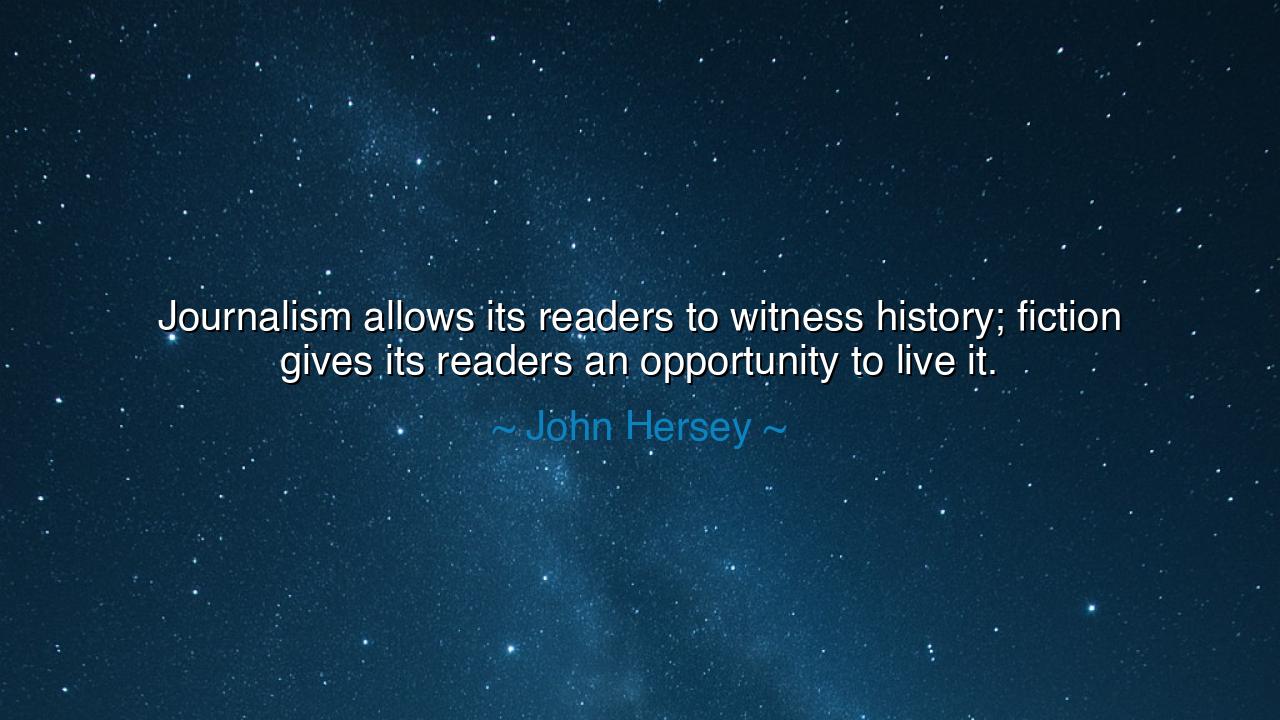
Journalism allows its readers to witness history; fiction gives
Journalism allows its readers to witness history; fiction gives its readers an opportunity to live it.






The writer John Hersey, whose pen carved truth into the conscience of nations, once declared: “Journalism allows its readers to witness history; fiction gives its readers an opportunity to live it.” In these words, there lies a wisdom as deep as time itself — the understanding that truth wears two garments: one woven of fact, the other of feeling. Both are sacred, and both are necessary. For to witness history is to behold the vast river of events as it flows before us; but to live it — to feel its pulse, its sorrow, its glory — one must enter the stream itself, and that is the power of fiction.
Hersey was no stranger to the weight of truth. His immortal work, Hiroshima, stands among the greatest acts of journalism — a chronicle of the atomic bomb’s devastation told through the eyes of those who survived. Yet even as he wrote in the language of fact, his heart sought something deeper: the human spirit hidden within catastrophe. When he later spoke of fiction as the means to live history, he did not dismiss truth — he sought to complete it. For journalism shows what happened, but fiction reveals what it felt like to be there. It opens the door from the mind to the soul.
From the ancient world to our own, this truth has echoed through the ages. The historians of Greece — Herodotus and Thucydides — wrote of wars and kings, of fleets and treaties. But it was Homer, the poet of myth, who taught generations what it felt like to be human amid such history. Through the songs of Achilles and Odysseus, he gave voice to courage, grief, rage, and longing. The historians let us witness the fall of Troy; Homer let us live it. Thus, even in the age of parchment and flame, the ancients knew: the facts of an age may die, but the emotions of its stories live forever.
And yet, one must not believe that fiction is a lie. Fiction is truth wearing the mask of imagination. It speaks in symbols, but its heart is real. When Dostoevsky wrote Crime and Punishment, he was not recounting an event in time — he was unveiling the human condition, the torment of guilt and the thirst for redemption. Through his fiction, readers did not merely read about sin; they felt it. They did not simply observe suffering; they endured it alongside his characters. Such is the miracle Hersey described — the transformation of words into experience.
But journalism, too, has its divine purpose. It anchors us to reality, it holds a mirror before humanity’s face and says, “Behold what you have done.” When Hersey’s Hiroshima appeared, it was not a novel — it was a revelation. The world, through his words, witnessed the horror of the atomic age. The readers saw, as though standing there, the ruins of a city, the silent suffering of the innocent. Journalism gave them the sight of history. Yet fiction, had it been written of the same event, would have given them the heart of it — the trembling fear, the lonely courage, the whisper of hope among ashes.
Thus, Hersey’s words are not a division but a harmony — a reminder that fact and feeling, witness and experience, must walk together. One without the other is incomplete. The journalist gives us the skeleton of history; the novelist gives it flesh and breath. The journalist teaches us what to know; the storyteller teaches us what to feel. Together, they forge the full shape of human understanding, the wisdom that neither reason alone nor emotion alone can bear.
Let this be the lesson for all who seek truth: to know the world, read journalism; to understand the world, read fiction. Do not shun either path, for both lead to enlightenment. When you behold a tragedy in the news, do not let it pass as numbers and names — imagine the lives behind them. When you read a story born of imagination, listen for the heartbeat of truth within it. For only when we both witness and live history can we truly learn from it. And in that learning, perhaps, we may shape a future where the stories we write — whether of fact or of faith — are worthy of remembrance.






AAdministratorAdministrator
Welcome, honored guests. Please leave a comment, we will respond soon